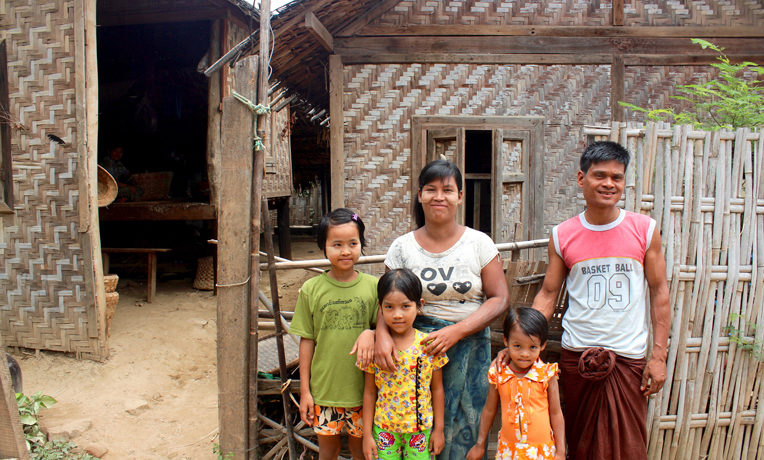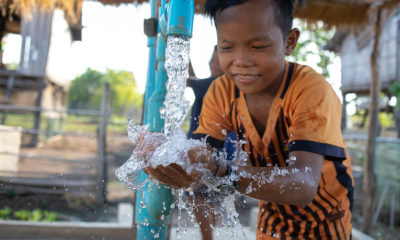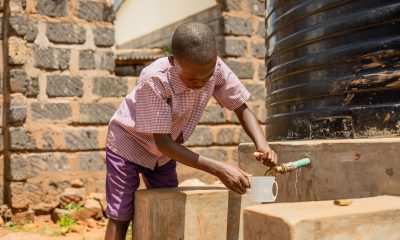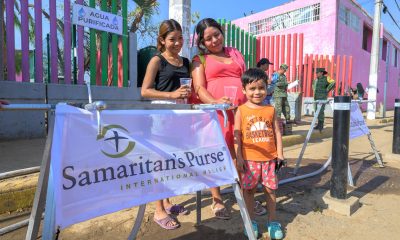A woman in Myanmar is overjoyed to receive a latrine from Samaritan’s Purse
Approaching the small bamboo hut covered in palm leaves from thatched roof to interwoven walls, I remembered the discovery of the story inside.
A few weeks prior, I sat in the village health center with Rem, a Samaritan’s Purse staff member, after observing a training.

Community members lay concrete rings inside the latrine pit. Latrine construction is usually a communal effort.
“Tell me about one of the most inspiring moments you’ve experienced during your work with Samaritan’s Purse,” I said.
Rem pushed her glasses further up on her nose as she thought. A smile formed on her lips as she described a memorable latrine beneficiary selection in Tada Oo Township. When a woman realized her family had been chosen to receive a latrine from Samaritan’s Purse, she rose from her chair with tears in her eyes and could not stop thanking our staff. Struck with curiosity to hear more of the story, I asked Rem about visiting the woman’s home for an interview.
In Myanmar, Samaritan’s Purse implements a project that focuses on hygiene promotion, latrine construction, and micronutrient powder to combat malnutrition. Our staff members visit two villages per week to conduct trainings that teach basic hand-washing principles and provide general health information.
After the hygiene training on Monday morning, our staff selects 10 eligible households to receive latrines. A family’s need is based on several variables, including the number of people living in their house, the number of children under 5 years old, and the occupation and income of the household leader.
In the days that follow, families learn about latrine usage, dig their own latrine pits, receive construction guidelines and materials, and undergo final structure checks. Friday marks the completion of the latrine project.
Overcoming the Difficulty of Sickness
Three weeks after my conversation with Rem, I found myself in the home of De Dah Lin, the woman who cried with joy at the latrine beneficiary selection. In the single-room bamboo hut, we sat at the table with her three little girls squirming as close to Mom as possible. Her husband and sister-in-law watched from chairs by the bed.
Having lived in this village for 17 years, Lin, 34, knows the struggles of daily life. Work proves difficult to find in the off-season, and even during the harvest, her family members may not receive consistent pay. When they cannot work in the fields, Lin and her family wrap cigarettes on the floor of their house to pay for food.
Because flooding occurs often during the rainy season and open defecation remains common practice, village wells easily become contaminated. This may result in high rates of diarrhea among residents. For the past three years, Lin has suffered from frequent diarrhea, and her daughters have fallen ill on a regular basis.
Before receiving their latrine from Samaritan’s Purse, the family walked a great distance from their house to defecate in a field. During flood seasons, they walked even farther to reach higher ground. At night in the fields, they had to be careful of snakes.
The day Lin sat in the health center waiting to see if her family would receive a latrine, she was weary. For many years, her family endeavored to save enough money for a latrine. They knew the unsafe and unsanitary realities of defecating in the fields, but they had no choice.
When Samaritan’s Purse called her name at the beneficiary selection, she was speechless. Her family would finally have a latrine nearby, her daughters would be safer at night, and their illnesses would subside.
Surviving the day-to-day remains the hardest part of living in Lin’s village. She and her husband constantly worry about being without work and unable to pay their daughters’ school fees. Even buying enough food is difficult sometimes.
“The best part of living here is when we overcome those difficulties,” Lin said.
In just one month, the latrine has helped their family greatly by decreasing their regular bouts of sickness.
We know we cannot alleviate the difficulties of every situation. We never will. But we can help solve a few problems in Tada Oo and make a difference in the lives of a few hundred families. Building a latrine may seem like a small difference to us, but to the families who receive them, it raises their quality of life.
Please pray for the families in Tada Oo as the monsoon season peaks and many villages experience hazardous flooding. Keep Samaritan’s Purse Myanmar in your prayers for favor, so we may continue to expand projects and bless people with the love of Christ.







